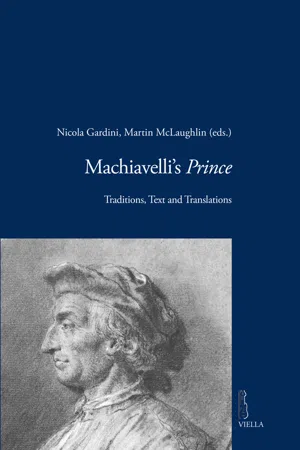![]()
I
Traditions
![]()
Robert Black
The Prince and the Political Thinker
The environment of The Prince is overwhelmingly negative: it is a corrupt political world that the new prince inhabits: “degli uomini si può dire questo, generalmente, ch’e’ sieno ingrati, volubili, simulatori e dissimulatori, fuggitori de’ periculi, cupidi del guadagno” (Principe, XVII.10). The stench of The Prince’s habitat is overpowering: “A ognuno puzza questo barbaro dominio” (XXVI.28). Contemporary Italians are compared to “el populo d’Israel … stiavo e oppresso da li egizi”; to “persi malcontenti dello imperio de’ medi” (who in turn have grown “molli e effeminati per la lunga pace”); to “ateniesi dispersi” (VI.11-14). Italy is lifeless, wounded, covered in filthy and festering sores.
The negative political milieu of The Prince is the domain of tyranny. Although the terms “tyrant” and “tyranny” are never used in the text, it is clear that the new prince for Machiavelli is synonymous with the tyrant. Discorsi I.xxv ends: “quello che vuole fare una potestà assoluta, la quale dagli autori è chiamata tirannide, debbe rinnovare ogni cosa, come nel seguente capitolo si dirà”. The next chapter goes on to discuss the new prince, as its title suggests: “Uno principe nuovo, in una città o provincia presa da lui, debbe fare ogni cosa nuova” (Discorsi, I.xxvi.1). In The Prince Machiavelli points to “Nabide principe delli spartani” (Principe, IX.19), but, rewriting the passage in the Discourses, Machiavelli says “Nabide, tiranno di Sparta” (Discorsi, I.xl.38). Machiavelli regarded “tyrant” and “tyranny” as terms that would cause offence to his Medici dedicatees: hence his euphemism the “nuovo principe”, a phrase hardly found in ancient, medieval and humanist writings on princely government.
The political environment of The Prince is the “stato”, a term used 115 times in the text. This word is often mistranslated as “state”. However, in Florentine usage of the fifteenth and early sixteenth century, “stato” did not carry the modern senses of a public embodiment of power, The State, or the commonwealth. Rather, it normally meant “regime”, used in the sense of membership of the ruling group of a city, or of power over a territory, city or people. It was not a synonym for “republic” or “city”. As befitted the regime of Machiavelli’s new prince (or tyrant), “stato” could have negative overtones. Disapproval is clear, for example, in the political writings of fifteenth-century Florentines such as Leon Battista Alberti, Agnolo Pandolfini or Giovanni Rucellai, for whom “stato” had a pejorative sense, associated with tyranny: to be a member of the regime (“trovarsi negli uffici e nello stato”) is not an honour for Alberti, who goes on to deride “men of the regime” with pejorative names such as “staterecci” or “statuali”. “What is it to be in the regime [in istato]?”, asks Pandolfini. “What use will you gain from it: … to be able to be overbearing, to crush, to rob with impunity?” “O mad, arrogant, haughty, avaricious tyrants! They cannot bear for others to be their equals; they do not want to live without crushing and stomping on the weakest … that’s why they want power [lo stato]”. “How can one gain power [lo stato], if not by robbing the public and individuals and subjects”, asks Rucellai.
Despite this depressing picture of tyranny, degradation and enslavement, Machiavelli still has hope for the future; because Italy has hit rock bottom, the only way can be up: “al presente, volendo conoscere la virtù di uno spirito italiano, era necessario che la Italia si riducessi ne’ termini presenti, e che la fussi più stiava che li ebrei, più serva che e’ persi, più dispersa che gli ateniesi: sanza capo, sanza ordine, battuta, spogliata, lacera, corsa, e avessi sopportato d’ogni sorte ruina” (Principe, XXVI.3). Machiavelli holds out hope for renewed Italian glory: glory is the aim of politics in The Prince. The paramount nature of glory is revealed in Machiavelli’s famous discussion of Agathocles, tyrant of Syracuse:
Agatocle siciliano, non solo di privata ma d’infima e abietta fortuna, divenne re di Siracusa. Costui, nato di uno figulo, tenne sempre per li gradi della sua età vita scelerata … fece da’ sua soldati uccidere tutti e’ senatori e e’ più ricchi del populo … e [il principato] di poi con tanti partiti animosi e periculosissimi mantenessi. Non si può ancora chiamare virtù ammazzare e’ suoi cittadini, tradire gli amici, essere sanza fede, sanza piatà, sanza religione: e’ quali modi possono fare acquistare imperio ma non gloria (Principe, VIII.4-10).
For Machiavelli, the final judge is history; glory is determined by the verdict of subsequent generations: “la … efferata crudeltà e inumanità con infinite sceleratezze [di Agatocle] non consentono ch’e’ sia in fra gli eccellentissimi uomini celebrato” (Principe, VIII.11).
With the focus on the prince’s own glory, it is no accident that Machiavelli hardly speaks of the common or public good in The Prince; the effects of his rule on his subjects are relevant insofar as they endorse or support his “stato” (“regime”): Machiavelli reduces the common good to secondary value, subservient to the good of the prince. In The Prince Machiavelli never uses the term “politico” – a word normally employed to describe a good and unselfish political order, in the sense of the public good (“vivere politico”) or of someone dedicated to the public good (“uomo politico”). Even Machiavelli’s praise for Cesare Borgia’s good government in the Romagna is ultimately about Borgia himself: “Era tenuto Cesare Borgia crudele: nondimanco quella sua crudeltà aveva racconcia la Romagna, unitola, ridottola in pace e in fede” (Principe, XVII.2). It is important to note here that the climax of the sentence is in the last word: “fede”, meaning “loyalty” and “obedience”. Good government is the means to an end:
Presa che ebbe il duca la Romagna – e trovandola suta comandata da signori impotenti, e’ q...
